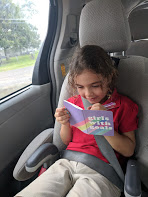I have been an elementary school teacher for 10 years now (read: I’m getting old), and my oldest daughter is a first grader this school year. School is the center of our lives because we both are there every day. I LOVE having my daughter at school with me. It’s a fabulous experience for both of us. Thank God I’m an elementary school teacher, because I’m pretty sure Lillian would not think me being at school is cool once she hits middle school. Because I’m at school every day with her, it is difficult for me to maintain a boundary between letting her do her thing and intervening on her behalf constantly. After all, I’m also friends with her teachers, have their cell phone numbers, and see them every day. There is a fine line between taking care of my baby as a parent and being in her teacher’s face about every little thing. That’s not going to help my Lillian, and it’s going to drive her teacher crazy.
When to Intervene:
1. When something is confusing. We have an open door policy at lunch, and Justin wanted to eat with Lillian. I, however, didn’t know Lillian’s lunch times. It’s an easy email to find out. Any time I need clarification on an adult matter, then a quick email is fine.
2. When your child is not being successful at school. It is always appropriate to email or call your child’s teacher and ask what you can do to help improve their grades, etc.
3. If your child is scared to bring up an issue to his or her teacher because they don’t want the other students to know. I occasionally get information from a parent about a bullying situation, and I had no idea what was going on. I have a pretty good feel for my class, but kids are sneaky, and I’m not with them 24/7.
4. When it’s something your child doesn’t need to know the details of, such as an adult situation that could affect your child. Parents get divorced, family members pass away, dogs die, it’s life. Even as adults we have trouble coping with these trying events, imagine what your child is going through when life happens. I think it is important to let teachers know what is going on, even if it just means a little extra hug or smile. Your child’s teacher doesn’t necessarily even need to bring up the event or situation, but they can show a little sympathy and that goes a long way.
When to Let Your Child Handle It:
1. When it’s something they should know. For example, “Lillian what do you have for homework?” If her reply is I don’t know, then she better be figuring it out. Her teacher is not going to assign homework to her, without telling  her what it is. Therefore, this one is on her. I’m not emailing her teacher to save her bacon, she has to learn to be responsible!
her what it is. Therefore, this one is on her. I’m not emailing her teacher to save her bacon, she has to learn to be responsible!
2. Keeping up with their materials. Papers that need to be signed, in class assignments, homework papers, etc. All of this should be on your child, perhaps with assistance. Honestly, it depends on your kid, but we aren’t packing snacks, homework folders, etc. at Casa de Courville. Lillian can handle all of this with a little reminder. But ultimately she knows, if I forget my snack for school, I’m just going to be hungry because Mom isn’t finding one in the middle of the day.
3. Minor concerns with classmates, etc. My daughter had some concerns about who she was sitting by. She is a worrier and was scared they were going to get her in trouble because they were talking to her, etc. This is ultimately no big deal, and I felt like Lillian should talk to her teacher about it. Lillian did have a quiet conversation with her teacher, and it helped her teacher to notice things. Lillian also felt like her voice mattered and was proud of herself for handling it on her own.
4. Friend issues that are basic kid things. I’m not saying never call another mom if you find out some big crazy issue, but I am saying, kids disagree sometimes. One day, they’re besties, the next they’re not. Let your kids work these things out. Lillian once spent a fair amount of time following around a “mean girl.” I never spoke to the child or the mother, but I did encourage my child to play with other friends, stand up for herself, etc. This went a long way in helping my people pleaser of a child understand how to politely deal with her friends.
Ultimately, use your discretion, but just know that helicopter parenting your child isn’t doing them any favors. When they enter the real world, they’re in for a huge shock, and they will be incapable of solving any sort of problem on their own.


















